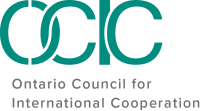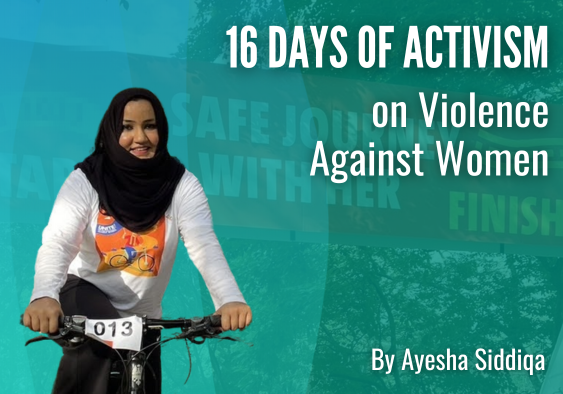16 Days Of Activism on Violence Against Women
Ayesha Siddiqa | February 13, 2025
I often ask myself why do we only have 16 days of activism for Gender-Based Violence (GBV) when the problem persists every single day? When will we move beyond symbolic campaigns and commit to 365 days of activism, ensuring that our fight against GBV is ongoing and relentless? We need to build mechanisms that remain active every day, not just for a few weeks in a year. Because human rights work is not a 9-to-5 job—it requires 24/7 dedication, compassion, and action.
Despite global commitments to gender equality, women continue to face systemic threats, discrimination, and violence. While international organizations, governments, and advocacy groups promote slogans of empowerment, the lived realities of women tell a different story. From South Asia, Southeast Asia to Canada, I have witnessed firsthand how deeply ingrained cultural norms, institutional barriers, and societal expectations continue to marginalize women, limiting their safety, autonomy, and opportunities.
As a facilitator with the UNHCR on International Rescue Committee (IRC) curriculum over the last few years, I engaged men in accountable practices in prevention of Gender-Based Violence (GBV) through focus-group discussions and working closely within communities. I have worked closely with survivors, advocates, and policymakers, navigating different legal and social landscapes. While some regions have progressive policies, the gap between legislation and implementation remains vast. Leading men’s groups on GBV was a profound learning experience, reinforcing the importance of including men in these conversations. Open, two-way communication can be challenging in some cultures, but I tailored my sessions to align with participants’ cultural norms, making it easier for them to engage. This approach fostered meaningful dialogue and helped shift perspectives. I believe that by creating safe, inclusive spaces, we can make men allies in the fight against GBV, ultimately leading to stronger, more supportive communities
I believe that strong women build strong societies, and if we truly want resilient communities, a thriving Canada, and a just world, we must take this issue seriously. Addressing GBV cannot be treated as an occasional priority; it must be ingrained in policies, education, and daily life. The time for temporary awareness is over—we need sustained efforts, real accountability, and systemic change to ensure that no woman or girl lives in fear. Our activism must not be limited to days on a calendar; it must become an enduring force for justice, equality, and lasting transformation.
In Canada, the situation is alarming. According to the official data, one woman or girl is killed every 48 hours. In 2024 there were 62 femicides recorded in Ontario. This also highlights the urgent need of passing Bill 173. This bill demands The Government of Ontario shall recognize that intimate partner violence is an epidemic in Ontario.
As an advocate for Gender-based Violence in humanitarian crises and in communities during the 16 days of activism in 2024 I had the privilege of speaking at the global summit on ending sexual and gender–based violence in Toronto, where I talked about the holistic approach to end GBV. I also highlighted the shortage of resources to accommodate the victims and survivors. Not only in Canada, but also in refugee camps and other humanitarian crises, we see how difficult it is to manage the huge number of cases with limited resources. I shared an example from Thailand where 5,500 urban refugees and almost 80,000 camp refugees at the Thai-Burma border live life with limited resources.
I also highlighted the importance of education as it can play a vital role for awareness and also making women strong. I shared how important it is to educate our daughters so they become aware of their rights, and to educate our sons so they know how to be the protector and ally of women. I mentioned that when we talk about GBV it doesn’t mean that we are blaming all the men, rather we need men as allies. Together, we can make not only Canada safe, but the world a safer place for a woman.
On December 4th I decided to further push for action. I launched a petition on change.org demanding the passing of Bill 173 in Ontario. This bill is not just a policy, it’s an important step toward a safe future for many girls and women. Through this bill we can translate advocacy into action. It is our collective responsibility to ensure that survivors are heard, protected, and supported through concrete legislative change.
During 16 Days of Activism I had the privilege of meeting MPP Jill Andrew who not only co-sponsored Bill 173, but also tirelessly advocates for its passage. During our discussion we talked about the importance of this bill and she also mentioned that women’s participation in politics is also very important. During our conversation I shared my efforts in raising awareness.
However, the bitter truth is that we cannot achieve gender equality through slogans alone, or with just a few days for activism and then forget the rest of the year. It requires 365 days of activism, actions with accountability and systematic change. We need real actions on the ground, and solutions, and women’s empowerment, and representation in reality. I hope through persistent action and commitment we can win that unfinished battle of gender equality.
 Ayesha Siddiqa
Ayesha Siddiqa
OCIC Youth Policy-Makers Hub Member & Gender Equality Advocate
Ayesha (she/her) is deeply passionate about higher education rights for refugees, health, and gender equality. Being the first woman in her family to graduate from university came with a great responsibility not just to prove her own strength, but to pave the way for other women. As an Educational Volunteer with UNHCR, she successfully advocated for refugee enrollment in universities, leading Siam University in Thailand to open its doors to refugees for the first time. As a DAFI Mentor, she engaged youth in educational opportunities, motivating them to build a better future. As a Community Facilitator, trained by UNHCR with IRC’s curriculum, she led gender-based violence (GBV) prevention sessions, working with both women and men to promote accountability and safer communities.







